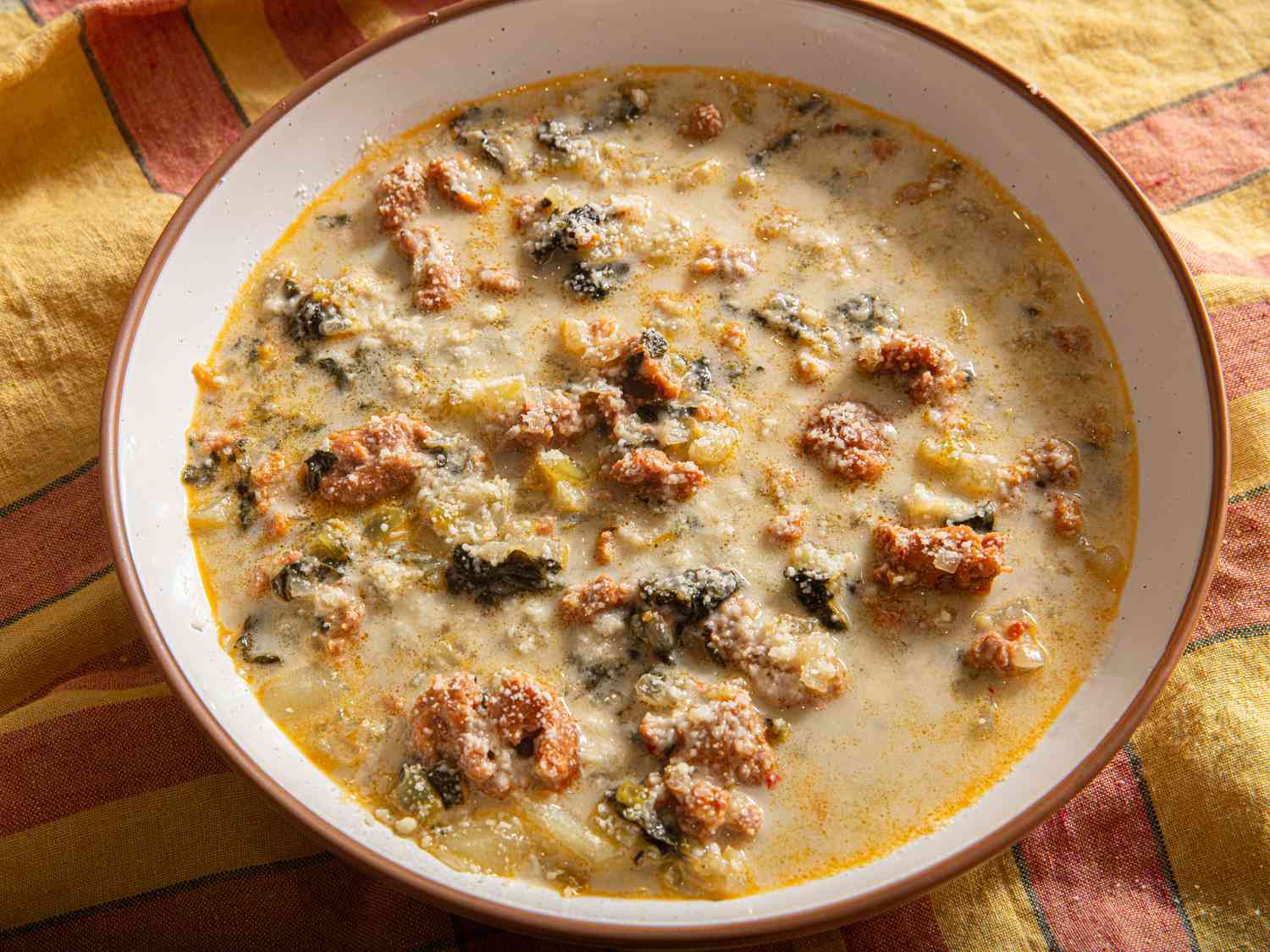Why This Recipe Shines
Cooking the aromatics in the rendered fat from the sausage adds a depth of flavor that enhances every spoonful. By incorporating fennel seeds, fresh fennel, and chili flakes, we embrace that quintessential Italian sausage essence. Cutting potatoes into uneven pieces allows them to partially dissolve into the soup, creating a natural thickening effect. For an extra layer of richness, consider simmering Parmesan rinds in your broth.
My experience with Olive Garden is limited to just one visit last year when I decided to try their renowned “zuppa toscana,” a dish I had heard rave reviews about but never tasted until then. In contrast, I’ve spent considerable time in Tuscany—working on a farm in Maremma Valley for several months and serving as sous chef under Cesare Casella at his former NYC restaurant Beppe.
With this background, I feel well-versed in Tuscan soups and their preparation. I’ve enjoyed many traditional dishes like acquacotta, ribollita, pappa al pomodoro, and various chickpea stews—not to mention Tuscan seafood classics like cacciucco that most Americans might not recognize. However, many can identify Olive Garden’s zuppa toscana—even if it doesn’t resemble any authentic Tuscan soup.
So how did it measure up? The zuppa toscana was undoubtedly the highlight of my meal there; however, it lacked that soulful touch needed for greatness. The flavors and textures didn’t meld as they should have for such a comforting dish. Nevertheless, its concept—a blend of sausage, kale, and potato in a creamy broth—has great potential.
Improving upon this classic isn’t rocket science; it’s about enhancing flavor integration so all elements harmonize beautifully: flavorful pork sausage enriching the broth; tender kale; potatoes melting into the mix while leaving behind delightful morsels; a rich yet light broth with just enough heat from red pepper flakes or spicy sausage.
When executed correctly, this dish becomes an all-in-one meal that warms both body and soul.
Tips for Elevating Your Zuppa Toscana
Step 1: Adapt Your Colleague’s Recipe
While enjoying my bowl at Olive Garden sparked ideas about how to enhance zuppa toscana further based on Genevieve’s creamy tortellini soup recipe—a close relative—I realized some key differences:
- Tortellini vs No Tortellini: Genevieve’s version includes tortellini while zuppa does not.
- Color Variations: Her recipe has tomato paste giving it a reddish hue along with orange ingredients like carrots; zuppa is much paler without these additions.
- Thickening Agents: Genevieve’s uses cream and flour whereas zuppa relies more on cream combined with potato starch (though proprietary thickeners may also be involved).
I believe there’s no need to reinvent what works well already! My goal was simply adapting her successful formula while making necessary tweaks for an improved copycat version of zuppa toscana rather than starting from scratch.
Key steps retained from Genevieve’s original include:
- Browning sausage first creates deep flavors through caramelization while rendering flavorful fat. 2. Sautéing onions alongside celery and garlic in this fat builds an aromatic base essential for depth.
- Blooming spices such as fennel seeds and chili flakes during cooking maximizes their flavor extraction by utilizing fat-soluble compounds effectively.
These foundational techniques set me up perfectly!
Step 2: Master “Grandma’s” Potato Technique
This method involves cutting irregular chunks from russet potatoes (you can leave skins on if you prefer). These uneven pieces cook differently—smaller bits soften faster than larger ones—and stirring helps break down overcooked parts into natural puree which thickens your soup beautifully while leaving behind tasty lumps!
Step 3: Enhance Flavor with Parmesan Rinds (Optional)
To elevate your broth even further use high-quality chicken stock or add one or two Parmesan rinds during cooking—this step is optional but highly recommended! Many cheese shops sell these affordable remnants which would otherwise go unused—or save your own leftovers!
After simmering them long enough they can be removed before serving or composted afterward—the choice is yours!
Finally finish off by stirring heavy cream into your pot before ladling servings topped generously with grated Parmigiano-Reggiano at each table setting—it’s sure worth trying out how any Tuscan might prepare their own take on this beloved dish if only they had thought of doing so themselves!
Copycat Zuppa Toscana Recipe That Outshines Olive Garden
Ingredients:
- 1 tablespoon extra virgin olive oil
- 1½ pounds Italian sausage (mild/spicy), casings removed
- 2 medium onions (8 oz each), finely chopped
- 3 cloves garlic (½ oz total), minced
- 3 celery ribs (~5¾ oz total) including leaves finely chopped
- 1 medium fennel bulb (~8 oz) finely chopped
- 1½ teaspoons fennel seeds
- ¼ teaspoon crushed red pepper flakes
- 10 cups homemade chicken stock/low-sodium store-bought broth
- Optional: Parmigiano-Reggiano cheese rinds + grated cheese for serving - Kale (~6 oz) stemmed & torn/cut into ~2-inch pieces
- Russet potato (~12 oz) peeled & cut irregularly ~½ inch thick
- Heavy cream (~½ cup)
Instructions:
In large pot over medium heat add olive oil until shimmering then brown sausages breaking apart meat until cooked through (6–8 minutes). Remove excess grease leaving around two tablespoons behind before adding onion/garlic/celery/fennel/fennel seed/red pepper flake mixture sautéed together until softened (~8 minutes).
Pour stock/broth slowly along with optional parmesan rind(s); bring mixture up towards boil then add kale simmering gently till softened slightly (~10 minutes).
Next introduce potato continuing simmering/stirring occasionally till fully cooked through allowing exterior slough off creating thicker consistency via released starches(~30 mins)—if stubborn stir more frequently aiding breakdown process!
Return browned sausages back letting meld flavors together skimming surface fats where necessary(~10 mins). Off heat stir heavy cream adjusting seasoning accordingly adding salt/pepper plus thinning out using warm stock if too dense desired consistency achieved finally serve garnished generously atop bowls freshly grated Parmigiano-Reggiano!
Storage Tips:
Leftovers keep well refrigerated within airtight containers lasting up-to four days reheat gently over low-medium flame prior enjoying again later down line!

